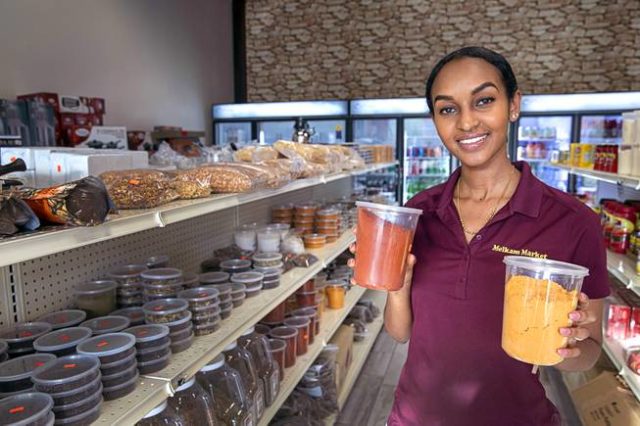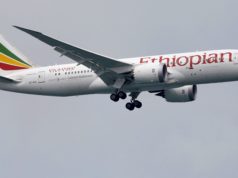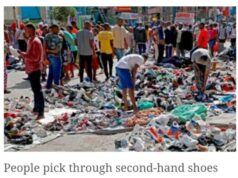Store manager Salem Tigabu displays a seasoned chile mixture, left, and chick pea powder at Melkam Market and restaurant, 4230 S. Decatur Blvd., Tuesday, Aug. 6, 2019.
The woody aroma of frankincense envelops Melkam Market, an Ethiopian store just west of the Strip on Decatur Boulevard. The floors are covered in green lentils, a common practice for those who observe Tsome Filseta, a period of fasting in Ethiopian Orthodox Christian tradition.
On the shelves are containers of staples in Ethiopian and Eritrean cuisine, items such as chickpea powder, spices and Ethiopian products like Tomoca coffee beans. A package of Tomoca costs $18, which manager Salem Tigabu says people are willing to pay top dollar for because the item reminds them of home.
The establishment, which opened less than a year ago, is one of dozens of Ethiopian-owned businesses in Little Ethiopia, a designation approved Tuesday by Clark County.
Nevada Assemblyman Alexander Assefa, who was elected last summer and believed to be the first Ethiopian-American elected to public office in the United States, was a driving force in getting the area between Tropicana Avenue and Spring Mountain Road the official designation. He’s the first African immigrant to serve in an elected office in Nevada.
“Being the first comes with a lot of responsibility,” he said.
This responsibility means giving his constituents the representation they deserve, Assefa said. Pushing to have part of his district be officially designated as Little Ethiopia is one way he is giving back to those who voted for him.
“(The designation) means recognizing that the community is part of the fabric of Las Vegas,” he said. “It makes us a beautiful, diverse state and will hopefully attract more business.” Assefa hopes to make the designation official before the Ethiopian New Year on Sept. 12.
“We have a lot of support for him,” said Tigabu, whose family traveled to Carson City for Assefa’s swearing into office. “It feels like he’s an active part of the city … we feel like we have a voice, and that voice is being heard.”
Fitsumberhan Mehari, co-owner of Lucy Ethiopian Restaurant on West Flamingo Road, describes the Ethiopian community as tight-knit where everyone knows one another. He first came to Las Vegas in 2008 as a refugee, which is a common story for many Ethiopian-born citizens living in Southern Nevada.
Las Vegas is an accessible city for immigrants because of the myriad service industry and transportation jobs, Mehari said. “Everybody works hard to reach where they are,” he said.
The designation is crucial in enhancing the visibility of Ethiopian business and culture, and could encourage more Ethiopian representation in the community, Tigabu said.
“I think this designation will elevate the culture and open people’s eyes that there is diversity in the community and that there are Ethiopians out there,” Tigabu said. “This will give people the opportunity to try new things.”
Kebreten Manaye was visiting Las Vegas from Washington, D.C., when she came across Melkam Market by sheer chance. Manaye was later astonished to learn that she and the store owners shared relatives in Ethiopia.
“It’s a nice place and very authentic,” she said. “You can’t beat the good hospitality.”
Mini Yohannes, co-owner of NU Ethiopian Kitchen, aims to marry traditional Ethiopian cuisine with contemporary, Western customer service.
When those who aren’t familiar with the cuisine visit Little Ethiopia, they’ll be greeted with staff willing to introduce them to their culture. For instance, Yohannes encourages those who are new to Ethiopian food to practice the traditional etiquette, such as using injera — a spongy Ethiopian flatbread — or hands as a vehicle for consumption.
Of course, Yohannes also offers forks and knives.
“I really want to attract everyone to Ethiopian cuisine,” she said. “I want them to try it, I want them to experience the feeling.”




























